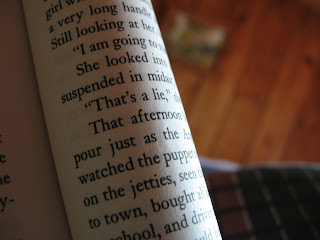 As much as I enjoyed Absolution, am I ever glad that I put Ali Smith on my Around the World in 52 Books challenge. The Accidental is one of the best books I’ve read this summer, with its echoes of Mark Haddon and David Mitchell (I still think his Black Swan Green has never gotten the attention it deserves; it’s a brilliant book), Smith’s novel quickly sucks you in with her switching voices, intuitive point of view and tumbling prose. And while she’s officially my Scottish writer, and this book is set in England, it’s hard to assess whether or not it’s an accurate reflection of the chosen country’s literature. I’ll probably have to delve into Smith’s backlist to find out if she’s written a book set in Scotland, but after reading The Accidental I’d be surprised if it wasn’t on the 1001 Book people’s radar and might be included in an updated version years in the future.
As much as I enjoyed Absolution, am I ever glad that I put Ali Smith on my Around the World in 52 Books challenge. The Accidental is one of the best books I’ve read this summer, with its echoes of Mark Haddon and David Mitchell (I still think his Black Swan Green has never gotten the attention it deserves; it’s a brilliant book), Smith’s novel quickly sucks you in with her switching voices, intuitive point of view and tumbling prose. And while she’s officially my Scottish writer, and this book is set in England, it’s hard to assess whether or not it’s an accurate reflection of the chosen country’s literature. I’ll probably have to delve into Smith’s backlist to find out if she’s written a book set in Scotland, but after reading The Accidental I’d be surprised if it wasn’t on the 1001 Book people’s radar and might be included in an updated version years in the future.
Annnnnywaaay.
The story of the Smart family (daughter, son, stepfather, mother) is told chapter by chapter in each character’s voice starting with Astrid (aforementioned daughter), as they spend the summer away from London in a “substandard” vacation house. When a stranger named Amber who has absolutely no connection to anyone in the family, regardless of what everyone in the house thinks, simply walks into their life and starts making changes, she becomes the catalyst that skyrockets the family into a whole other world in terms of their physical and emotional lives.
Each character has a specific, overriding emotional issue: Astrid’s being bullied at school; Magnus suffers through a tragedy somewhat of his own making; Michael, the step-father, needs to deal with his, ahem, indiscretions; and Eve, the mother, suffers from a writer’s block that bleeds into all aspects of her person. But when Amber bashes into their lives and mashes up their thoughts not only about each other but about the various issues that are pulling them apart and in all different directions. Amber is a hippie, a charlatan, a psychic, a seductress, and her presence finally makes everyone come to terms with the facades that structure even the purest of lives.
On the whole, it took me a long time to get through this book. I picked it up months ago and read 30-odd pages and then put it down. Picked it up again a few weeks later, started from the place I stopped, got confused and gave up. But this weekend at the cottage, after a particularly intense game of multi-language Scrabble, I relaxed before swimming and read the entire book from cover to cover. And I loved it. I really did.
PHOTO IN CONTEXT: I’m proudly displaying the book on my grandmother’s sideboard-thingy that has pictures of her tucked into that totally creepy print of my uncle’s. Oh, and I think I have the US version of the book because I ordered it through my old work…



